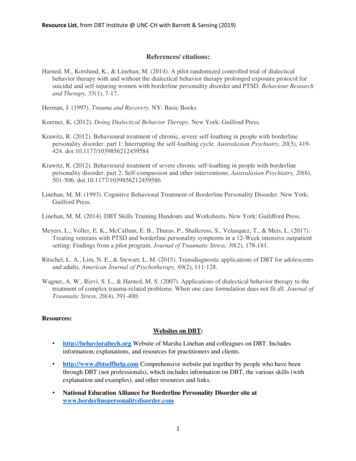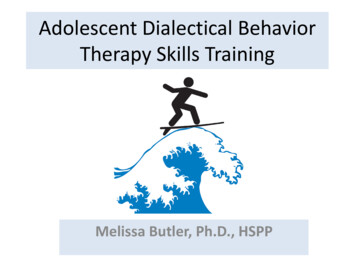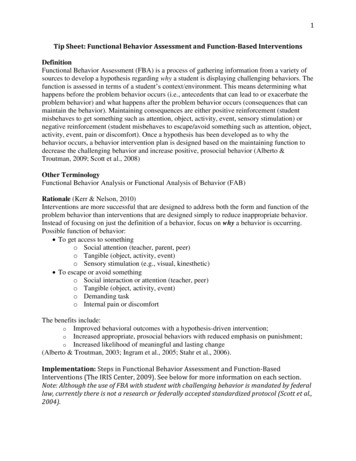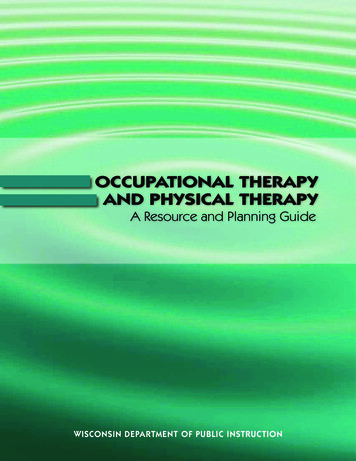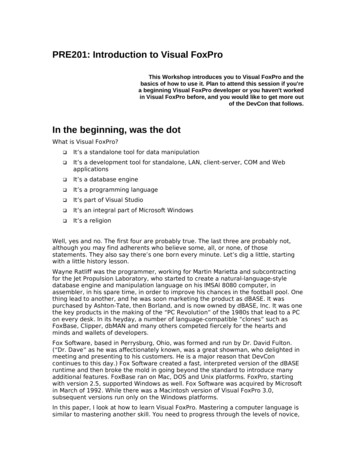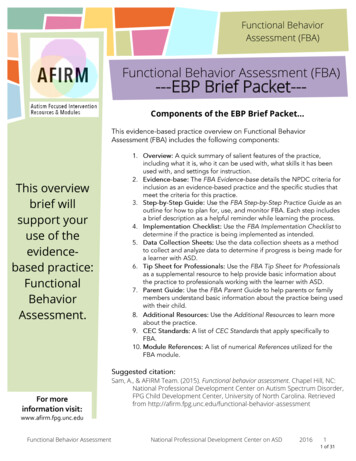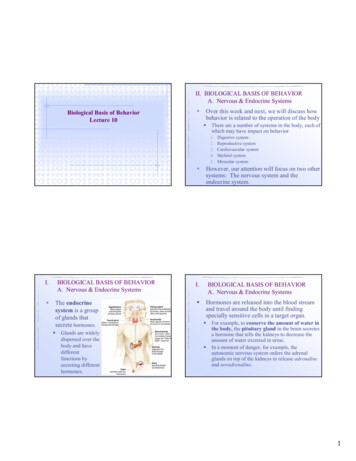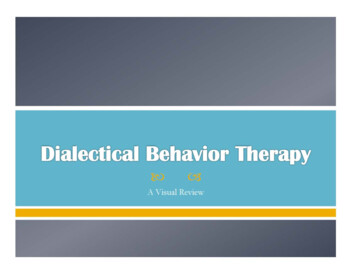
Transcription
Dialectical Behavior Therapy: A Visual ReviewSkills Flash CardsThese cards are helpful in familiarizing both clients and therapists with the Skills Modules within DBT and may beused in conjunction with Skills Group or Individual Therapy. The cards are helpful for clients to use as a quick referencewhile they are busy living their daily lives. The images found within are from the “Dialectical Behavior Therapy: A VisualReview” presentation. The cards were created by Dr. Steve McCandless, Psy.D and Stephanie Johnston, LCSW of the Central Arkansas Veterans Healthcare System in collaboration with artist Kevin Cates. The project was made possible through agrant from the South Central MIRECC. Please feel free to use and distribute the cards as needed.Instructions for Use Print the following pages then copy front and back onto one page. Make sure the numbers ‘1’ and ‘2’ are on opposite sides of the first page and in the same location. Once printed cut along the dotted lines and put in sequential order. Blank cards are numbered 63-71 and are included for notes if desired. The cards can be stapled together or laminated with a hole punch in the top left corner andplaced on a key ring,
1DialecticalBehaviorTherapy3BioSocial Model5BioSocialTheoryFlash Cards for Skills UseEmotionally Sensitive Baby Invalidating Environment97Dialectical Dilemma11Dialectical DilemmaDialecticalDilemmasUnrelenting CrisisEmotional Vulnerability
462BioSocial TheoryBorderline PersonalityDisorderSensitive Child Invalidating Environment Borderline Personality Disorder1.Fear of Abandonment2.Chaotic Relationships3.Identity Disturbance4.Impulsivity5.Suicidal or Self Harm Behavior6.Mood Instability7.Feelings of Emptiness8.Intense Anger9.Stress related Paranoia1012Dialectical DilemmaWhat is DBT?DBT was developed in the mid-1990’s by Dr. MarshaLinehan. It combines both person-centered therapy basedon acceptance with cognitive behavioral therapy based onchange. This dialectic of change and acceptance remainscore to the treatment. It is comprised of Skills Training inMindfulness, Distress Tolerance, Emotion Regulation, andInterpersonal Effectiveness as well as Individual Therapy.In Individual Therapy diary cards and a target hierarchyare used to organize sessions.8Dialectical DilemmaDialectical DilemmasOr Secondary TargetsSelf InvalidationInhibited Grief Unrelenting Crisis vs Inhibited Grief Emotional Vulnerability vs Self Invalidation Active Passivity vs Apparent Competence
1513Opposite Action SkillDialectical e PassivityOpposite Action Skill19Opposite Action SkillShame21Opposite Action SkillAngerEmotion:AngerAction Urge:Action Urge:HideAttack23
18Opposite Action SkillShame1416Dialectical DilemmaGoals ofEmotion RegulationUnderstand and name your own emotions. Decreasethe frequency of unwanted emotions.Decrease emotional vulnerability. Decrease vulnerability to emotion mind. Increase resilience, your ability tocope with difficult things and positive emotions.Decrease emotional suffering. Reduce suffering whenpainful emotions overcome you. Manage extremeemotions so that you don’t make things worse.Justified:Apparent CompetenceViolated Group Moral2422Opposite Action SkillAngerOpposite Action SkillAnger20Opposite Action SkillShameOpposite Action:1. Step Back2. Be KindJustified:Opposite Action:Goal BlockedBe Proud, Show Up
25Opposite Action SkillSadness2729Opposite Action SkillOpposite Action SkillEmotion:Emotion:SadnessFearAction Urge:IsolateOpposite Action SkillFearOpposite Action Skill3133Opposite Action SkillJoyEmotion:JoyAction Urge:Action Urge:AvoidRepeat35
3036Opposite Action Skill28Opposite Action Skill26Opposite Action SkillFearSadnessSadnessJustified:Opposite Action:Justified:DangerEngageLossOpposite Action Skill34Opposite Action Skill32Opposite Action SkillJoyJoyFearOpposite Action:Justified:Opposite Action:AvoidImproves LifeApproach
Interpersonal Effectiveness37GIVE SkillInterpersonal Effectiveness39DEAR MAN Skill41InterpersonalEffectivenessSkillsTo Keep RelationshipsInterpersonal EffectivenessTo Obtain Your ObjectiveMindfulness Skill4345FAST SkillWise MindMindfulnessSkillsThe Middle PathTo Keep Self Respectbetween Emotional Mindand Rational Mind47
42Interpersonal EffectivenessDEAR MAN Skill40Interpersonal EffectivenessGentle: No attacks, threats, judging, or nonverbal cues of eye rolling or smirking.Express: your feelings.Interested: Don’t interrupt, maintain good eyeAssert: what you want to happen.contact.Reinforce: the consequences both positive and negative.Validating: Show that you understand theother person. See the world from their point ofview. Put yourself in their shoes.Mindful: be a broken record, don’t get distracted.Appear confident: Hold your ground.Easy manner: Stay light hearted and smile.Negotiate: Cooperate & be fair.To Obtain Your ObjectiveMindfulness SkillGoals ofGIVE SkillDescribe: the situation.4838Interpersonal EffectivenessBe skillful in getting what you want and need from others.Get others to do things you would like them to do. Get others to take your opinions seriously. Say no to unwanted requests. Build relationships and end destructive ones.Strengthen current relationships. Don’t let hurts and problems build up. Use relationship skills to head off problems.Repair relationships when needed. Resolve conflicts beforethey get overwhelming. Find and build new relationships.End hopeless relationships. Walk the middle path. Createand maintain balance in relationships. Balance acceptanceand change in relationships.To Keep Relationships46Interpersonal Effectiveness44FAST SkillGoals ofMindfulnessWise MindReduce suffering and increase happiness. Reducepain, tension, and stressIncrease control of your mind. Stop letting yourmind be in control of you.Experience reality as it is. Live life with your eyeswide open. Experience the reality of your connectionto the universe, essential goodness, essential validity.Emotional MindRational MindbeFair: to yourself and others.no Apologies: don’t look ashamed, keep yourhead and eyes up, no apologizing forbeing alive or for making a request.Stick to values: don’t sell out your integrity.Stick to your guns.be Truthful: Don’t lie or act helpless whenyou’re not.To Keep Self Respect
Mindfulness Skill4951Rational MindT53Distress Tolerance: TIPP SkillDistressToleranceSkillsExcessive Cold,Over-regulated,and RoboticTemperatureIDistress Tolerance: TIPP SkillIntense Exercise55P57PDistress Tolerance: TIPP SkillDistress Tolerance: TIPP SkillPaced Breathing:ProgressiveIn Through the NoseMuscle Relaxation59
T54Mindfulness Skill5052Emotional MindDistress Tolerance: TIPP SkillGoals ofTip the Temperature of your facewith cold water to calm down fast. Distress ToleranceHolding your breath, put your face in abowl of cold water, or hold a cold packon your eyes and cheeks.Survive Crisis Situations without making them worse. Hold for 30 seconds. Caution: Very cold water can decreaseyour heart rate rapidly. Consult yourhealth care provider before using thisskill if you have a medical condition.Become Free: of having to satisfy the demands of yourown desires, urges, and intense emotions.Accept Reality: replace suffering and being stuck withordinary pain and the possibility of moving forward.Excessive Hot, Under-regulated,and AnimalisticDistress Tolerance: TIPP Skill58PDistress Tolerance: TIPP Skillrelaxation with breathing out.While breathing into your belly deeplytense your body muscles. While breathing out, say the word“Relax” in your mind. Release the tension in your muscles.56Distress Tolerance: TIPP SkillTo calm down your body when it isrevved up by emotion.To calm down by pairing muscle IP60Paced Breathing:More slowlyOut Through the Mouth Engage in intense exercise if only for ashort while. Expend your body’s stored up physicalenergy by running, walking fast, jumping, jumping jacks, playing basketball,etc. Caution: Intense exercise can raise yourheartrate rapidly. Consult your healthcare provider before using this skill ifyou have a medical condition.
6163656971AcknowledgmentsKoerner, Kelly (2011). Doing Dialectical Behavior Therapy: A PracticalGuide. New York: Guilford Press.Linehan, M. M. (1993a). Cognitive Behavioral Treatment of BorderlinePersonality Disorder. New York: Guilford Press.Linehan, M. M. (1993b). Skills Training Manual for Treating BorderlinePersonality Disorder. New York: Guilford Press.Linehan, M.M. (2014a). DBT Skills Training Manual (2nd ed.). New York:Guilford Press.Linehan, M.M. (2014b). DBT Skills Training Handouts and Worksheets(2nd ed.). New York: Guilford Press.67
666462727068
Dialectical Behavior Therapy: A Visual Review Skills Flash Cards These cards are helpful in familiarizing both clients and therapists with the Skills Modules within DBT and may be used in conjunction with Skills Group or Individual Therapy. The cards are helpful for clients to use as a quic

